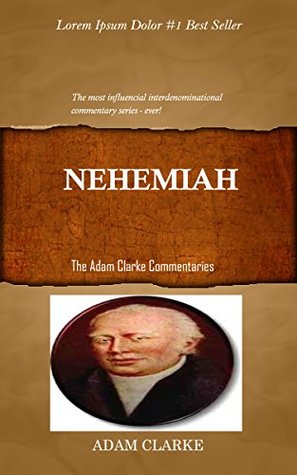- Bible
- Read the Bible
- Bible Versions
- Verse of the Day
- Reading Plans
- Verses by Topic
- Books of the Bible
- Bible Images
- Study
- Commentaries
- Concordances
- Dictionaries
- Encyclopedias
- Sermons
- Bible Atlas & Maps
- BP Wiki
- Devotionals
- Today's Devotionals
- Light of the World
- All Devotionals
- Inspirational Quotes
- More
- Picture Quotes
- Videos
- Inspirational
- Bible Study
- What The Bible Says
- Bible Q&As
- Daily Bread
- Bible by Genre
- Bible Stories
- Random Bible Verse
- Community
- Store
Clarke On Nehemiah: Adam Clarke's Bible Commentary
by Adam Clarke
After John Wesley, Adam Clarke is probably the best known Methodist theologian
Clarke’s greatest contribution to Christians all over the world is his commentary on the Bible, a work that took 40 years to complete. This commentary was the main resource for Methodists for over two hundred years!
These volumes are a treasure trove of Scriptural insight and assistance.
We are delighted to now present his commentary to you on the Kindle in an easy-to-use fashion that helps you build up your collection of commentaries for use in home Bible studies, preaching engagements and investigations into God’s Word.
The version we present to you is easily navigable both backwards and forwards. It provides a clear, concise layout that brings to life the words Wesley penned all those years ago.
As a commentary the value of Adam Clarke’s contribution must not be underestimated. His writing is doctrinal but not dogmatic. He shines new light on various passages but all the time remaining true to the biblical meaning.
This book provides his commentary on:
• Nehemiah
As part of this publication there is an extensive study guide designed to help you in your quest to better study the Bible.
➢ Study Guide
➢ A Secret Of Understanding The Bible
➢ The Different Genres Of The Bible
➢ Understanding The Bible By Grasping The Big Picture
➢ 4 Essential Tips
➢ The Authority Of The Bible
➢ The Theme Of The Bible
➢ The Impact Of The Bible On Our Lives
➢ How To Study The Bible
Clarke’s greatest contribution to Christians all over the world is his commentary on the Bible, a work that took 40 years to complete. This commentary was the main resource for Methodists for over two hundred years!
These volumes are a treasure trove of Scriptural insight and assistance.
We are delighted to now present his commentary to you on the Kindle in an easy-to-use fashion that helps you build up your collection of commentaries for use in home Bible studies, preaching engagements and investigations into God’s Word.
The version we present to you is easily navigable both backwards and forwards. It provides a clear, concise layout that brings to life the words Wesley penned all those years ago.
As a commentary the value of Adam Clarke’s contribution must not be underestimated. His writing is doctrinal but not dogmatic. He shines new light on various passages but all the time remaining true to the biblical meaning.
This book provides his commentary on:
• Nehemiah
As part of this publication there is an extensive study guide designed to help you in your quest to better study the Bible.
➢ Study Guide
➢ A Secret Of Understanding The Bible
➢ The Different Genres Of The Bible
➢ Understanding The Bible By Grasping The Big Picture
➢ 4 Essential Tips
➢ The Authority Of The Bible
➢ The Theme Of The Bible
➢ The Impact Of The Bible On Our Lives
➢ How To Study The Bible
BUY NOW
Kindle Edition, 115 pages
Published August 28th 2015
© 2025 Bibleportal.com All rights reserved.

Adam Clarke (1762 - 1832)
Was a British Methodist theologian and Biblical scholar. He is chiefly remembered for writing a commentary on the Bible which took him 40 years to complete and which was a primary Methodist theological resource for two centuries. Contained in 6 volumes, consisting of nearly 1,000 pages each, it was considered the most comprehensive commentary on the Bible ever prepared by one man.As a theologian, Clarke reinforced the teachings of Methodist founder John Wesley. He taught that the Bible provides a complete interpretation of God's nature and will. He considered Scripture itself a miracle of God's grace that "takes away the veil of darkness and ignorance." With such an understanding, Clarke was first and foremost a Biblical theologian, often uneasy with purely systematic approaches to theology.
Clarke is chiefly remembered for writing a commentary on the Bible which took him forty years to complete and which was a primary Methodist theological resource for two centuries.
As a theologian, Clarke reinforced the teachings of Methodist founder John Wesley. He taught that the Bible provides a complete interpretation of God's nature and will. He considered Scripture itself a miracle of God's grace that "takes away the veil of darkness and ignorance." With such an understanding, Clarke was first and foremost a Biblical theologian, often uneasy with purely systematic approaches to theology.
Clarke followed Wesley in opposing a Calvinistic scheme of salvation, preferring instead the Wesleyan-Arminian positions regarding predestination, prevenient grace, the offer of justification from God to all persons, entire sanctification, and assurance of salvation. Perhaps his most controversial position regarded the eternal Sonship of Jesus. Clarke did not believe it Biblically faithful to affirm this doctrine, maintaining that prior to the Incarnation, Jesus was "unoriginated." Otherwise, according to Clarke, he would be subordinate to God and therefore not fully divine. This was important to Clarke because he felt that Jesus' divinity was crucial to understanding the atonement.
Clarke's view was opposed by many Methodists, notably Richard Watson. Watson and his allies argued that Clarke's position jeopardized the integrity of the doctrine of the trinity. Clarke's view was rejected by Methodism in favor of the traditional, orthodox perspective.
... Show more